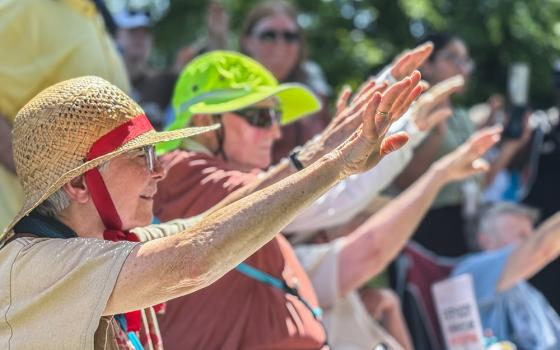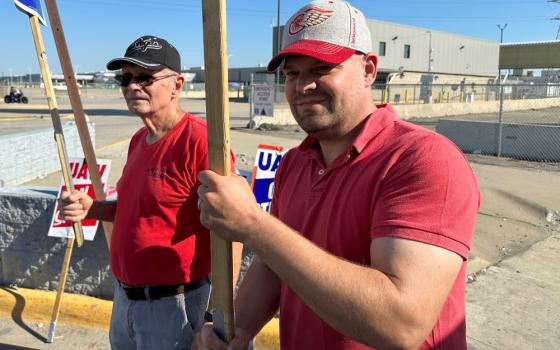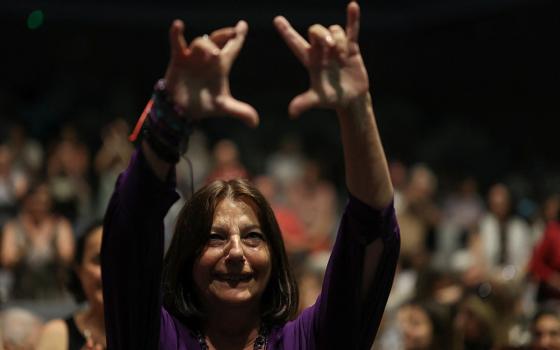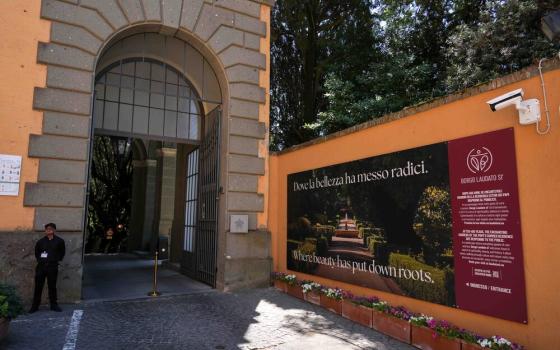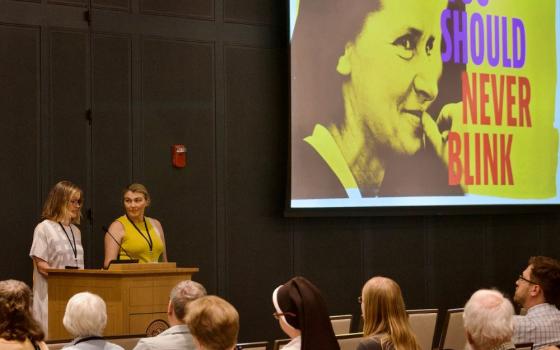
The Eiffel Tower is seen March 17 during the coronavirus lockdown in Paris. (Dreamstime/UlyssePixel)
"Am I my brother's keeper?" (Genesis 4:9)
"This is the question that we must all ask ourselves at the moment," said Sr. Véronique Margron, provincial prior of the Dominican Sisters of the Presentation and president of the Conférence des Religieux et Religieuses de France, France's conference for men and women religious. "We can continue to destroy each other ... if we don't follow instructions" when it comes to the new coronavirus spreading across the globe.
She said she worries about how Christians can continue to be close to the vulnerable: "What support the church provides in normal times no longer exists, is no longer directly accessible."
As of March 25, France had 22,302 confirmed cases of COVID-19, and 1,100 people have died so far. The number of victims is still increasing.
Margron recalls the confinement instructions given by the French government on March 12: no public celebrations, and during intracommunity celebrations, strict compliance with social distancing measures of 1 meter. These rules are also to be respected as much as possible in the life of the community.
These safety measures are in force until March 26 and are widely expected to be extended until the middle or end of April.
"As our chapel is very large, we can easily stay away from each other, as we've been told. We have the impression that there are many of us, as in the past," said Sister Marie Joseph de la Passion, a Little Sister of the Poor who lives in La Tour, the motherhouse of her community in France, in Saint-Pern in Brittany. "In the refectory, we only occupy every other seat of the tables."
Advertisement
While understanding the restrictions and following them carefully, Sister Marie Joseph said she was sorry the community could no longer welcome groups of people who regularly came to La Tour to pray or attend Sunday Mass.
The Little Sisters of the Poor run houses for elderly people with little means. Today, there are 465 sisters in France in charge of 36 houses.
"In all our homes, the staff makes a point to pay more attention than ever. We have to make sure we do not make elderly people's feelings of loneliness worse than normal, especially since visitors are not allowed anymore," Sister Marie Joseph said.
These concerns are the same in other women religious communities that work in other fields, like schools and health centers. In old people's homes, where some elderly sisters live in community with residents, their presence is essential, especially because visits have been prohibited there for the past two weeks.
"We have two communities in an old people's home of 80 residents" in the west of France that has been relatively spared, said Sr. Eliane Loiseau, mother superior for the Missionary Sisters of the Gospel for France.
Since all visitors are forbidden, the elderly can feel even more alone and become desperate. The sisters continue to stay in touch with confined old people, both lay and religious, whom they used to visit regularly, Margron said.
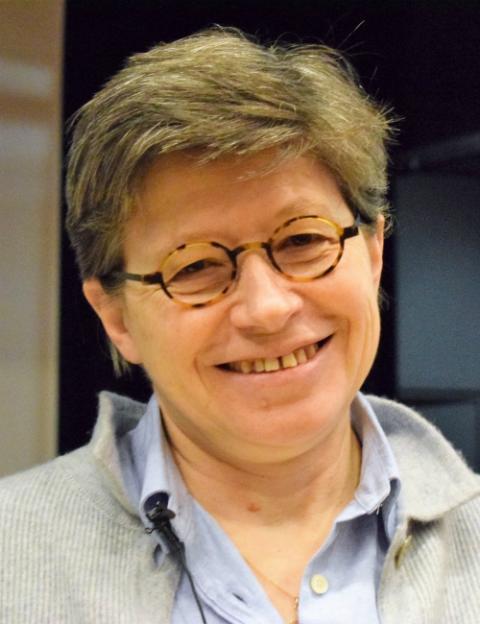
Sr. Véronique Margron (Provided photo)
"Contacts are made by phone; an invisible network continues to be present. Basic solidarity continues," she said. "I am amazed to see how the elderly sisters keep ties with loved ones, family and friends."
"As for the elderly who live at home on their own, there is a danger that they will feel even more alone," she added. "The elderly, often worried, are even more worried at the moment. Loneliness is compounded by despair."
"For people who live alone, the link with the outside world is often very fragile: It can be a helper who comes in every day," Margron said. "What happens if she is sick or simply unable to come for work?"
There is an upside, Loiseau pointed out.
"This crisis, which forces us to use modern, virtual means of communication, has enabled some older sisters to familiarize themselves with these technological instruments that frightened them and to use them to keep in touch with others," she said. "We all work from home, we stay in our communities, where we are confined. We have video conferences, we send documents to each other, talk a lot on the telephone."
More than half of the nuns in France are over 80 years old, so most of them cannot exercise the traditional functions of nurses as in previous epidemics, even though many of them continue to run health facilities where basic care is provided.
"In my community, we all have health concerns and cannot directly help the victims of COVID-19," said Sr. Marie Hélène Halligon of the Our Lady of Charity of the Good Shepherd community. "We pray together morning and evening. We watch Mass on the Catholic channel every evening at 6:15 p.m., and at the time of Communion, we take Communion with the hosts that a priest left us last week in anticipation of confinement."
Members of her community live in apartments in Strasbourg, and the neighbors are helping each other. For example, French authorities have asked each person who wants to leave home to fill out a certificate indicating the purpose of his or her errand — buying groceries or walking the dog, for example. This certificate is valid for one hour and allows you to go out but no further than 1 kilometer away from your home.
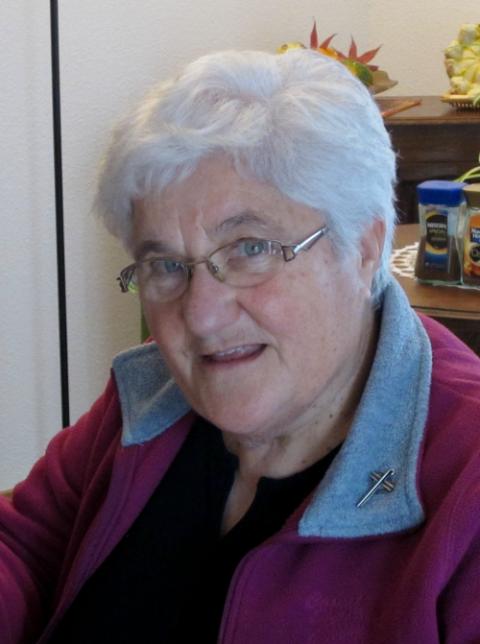
Sr. Marie Hélène Halligon (Elisabeth Auvillain)
"In our building, someone printed and deposited a stack of these certificates. The residents of the building, who do not all have a printer, can have it when they want to go shopping," Halligon said.
For someone like Halligon, who is committed to the fight against human trafficking, the necessary confinement can have disastrous consequences.
"I worry that the violent men are confined," she said. "In such a situation, they may turn even more violent, and we must help the women who are in their grip." The French government has posted to social media the phone numbers to call in case of domestic violence.
Every sister agrees that this crisis also provides an opportunity to question how we live the present moment.
"I have invited the members of our congregation to reflect on what time means: the time I give, the time I lose," Loiseau said.
Margron said she is worried about the new challenges created by this period for Christians, challenges that often are concrete. "The most crucial question is that of funerals: If someone close to you dies, what do you do? The operational support is no longer there. How do we continue to show our presence? How can we exercise our apostolate, in what other way?"
New rules of confinement state that no more than 20 mourners can gather in a church for a funeral service.
On March 23, French President Emmanuel Macron invited the heads of the main religions in France to discuss how to celebrate funerals while being careful to avoid risks of contagion by the virus.
The representatives of religions welcomed the initiative.
"When I see how our secular system of government cares about the role of religious celebrations, what these ceremonies do for the common good, the service they provide for believers and nonbelievers alike, I find this magnificent," Margron said. "In the midst of this chaos, of all that it has to do, in the midst of its duties and worries, the government shows that it is concerned about ways to give support to people mourning. This, to me, is a beautiful gesture. It's up to us religious men and women to be up to the task."
[Elisabeth Auvillain is a freelance journalist living in Paris.]


